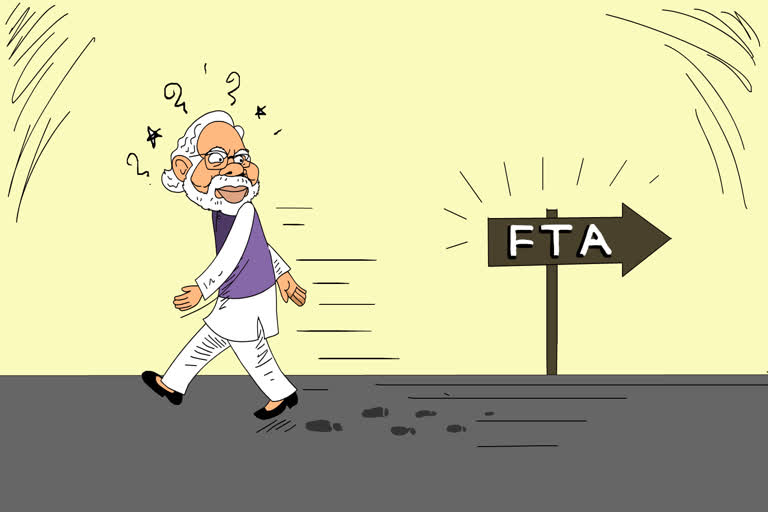Hyderabad: Speaking at the CII Exports summit, earlier this month, Union Minister for Commerce and Industry, Piyush Goyal said that India will not sign any free trade agreement (FTA) in a hurry or to the disadvantage of industry and exporters.
In fact, recently India decided to not to join the Regional Comprehensive Economic Partnership (RCEP), after negotiating for nearly seven years, largely due to concerns that, it affects our industry and exports. As India adopts a stance that is cautious and gradual towards free trade, it is time to discuss and debate about the possible opportunities that free trade offers, the challenges it brings with it and the ways to reap its benefits by tackling them.
The arguments for and against Free Trade
Free trade has been one of the main driver of 21st-century globalization, with the world markets getting deeply integrated. It in fact enables the countries to export their surpluses at competitive prices and import cheaper goods, which are otherwise costlier in their home countries. This in turn boosts exports, generates employment and push up outputs of the countries involved in the free trade.
However, there is a second side of the coin that brings forward a different insight. As countries differ in their factor endowments, technology, economic conditions and political setup, etc., their productivity levels differ and thus the prices of the commodities in every country differ. As a result of this, many countries complain that the Free Trade Agreements are beneficial to those countries that produce and exports cheaper goods and it is disadvantageous for the importing countries. This is in essence, the arguments for and against the free trade.
How India can reap the benefits of Free Trade:
India’s concerns related to Free Trade Agreements falls under the second category of the above arguments. This is the main reason behind India’s cautious approach towards RCEP or other FTAs with the United States or United Kingdom. It is a fact that India’s concerns in this context are real and genuine.
The main bone of contention for India’s reluctance to join RCEP was its concern about the dangers posed to the country’s employment and output, due to the flood of cheap goods. However Indian negotiators at the FTA negotiating tables need to strongly negotiate for the inclusion of the safety valve mechanism, which helps the automatic trigger mechanism for protection for Indian goods, for a particular period of time.
This time can be utilized to restructure and strengthen the industries that are affected by the FTA. This mechanism has been one of the main bones of contention between RCEP members and India recently.
Read more:Rewind 2019: Slowdown affects fund raising via IPOs by 60%
It is in this context, it is to time to understand and acknowledged that free trade brings along with it, both costs and benefits, as it involves multiple players with their respective national interests. In order to get the best deals, one need to be competitive enough in international trade negotiations. This could be achieved by making the country, one of the important links in the chain of the global supplies.
In order to reach this point, there is an urgent need to overhaul the manufacturing sector by bringing in reforms aimed at raising the efficiency and improving its productivity. On the other hand the export sector need to be given impetus by clearing the infrastructural bottlenecks and easing norms further, for investments related to export promotion. It takes a considerable amount of policy interventions and the present dispensation has enough political capital to bank upon.
It is pertinent to remember in this context that India’s growth story has been one of the illustrious episode in the recent economic history. Free trade offered ample space and scope for India’s economy to grow and expand over a period of time. At this point if India is lagging behind in reaping the benefits offered by free trade, it would be wise to look into the aspects that are pulling it down, and then get ready to reap them. The Writing on the wall is clear: We cannot ignore the winds when we sail in the Sea.
(Article by Dr. Mahendra Babu Kuruva, Assistant Professor, H.N.B.Garhwal Central University, Uttarkhand)



